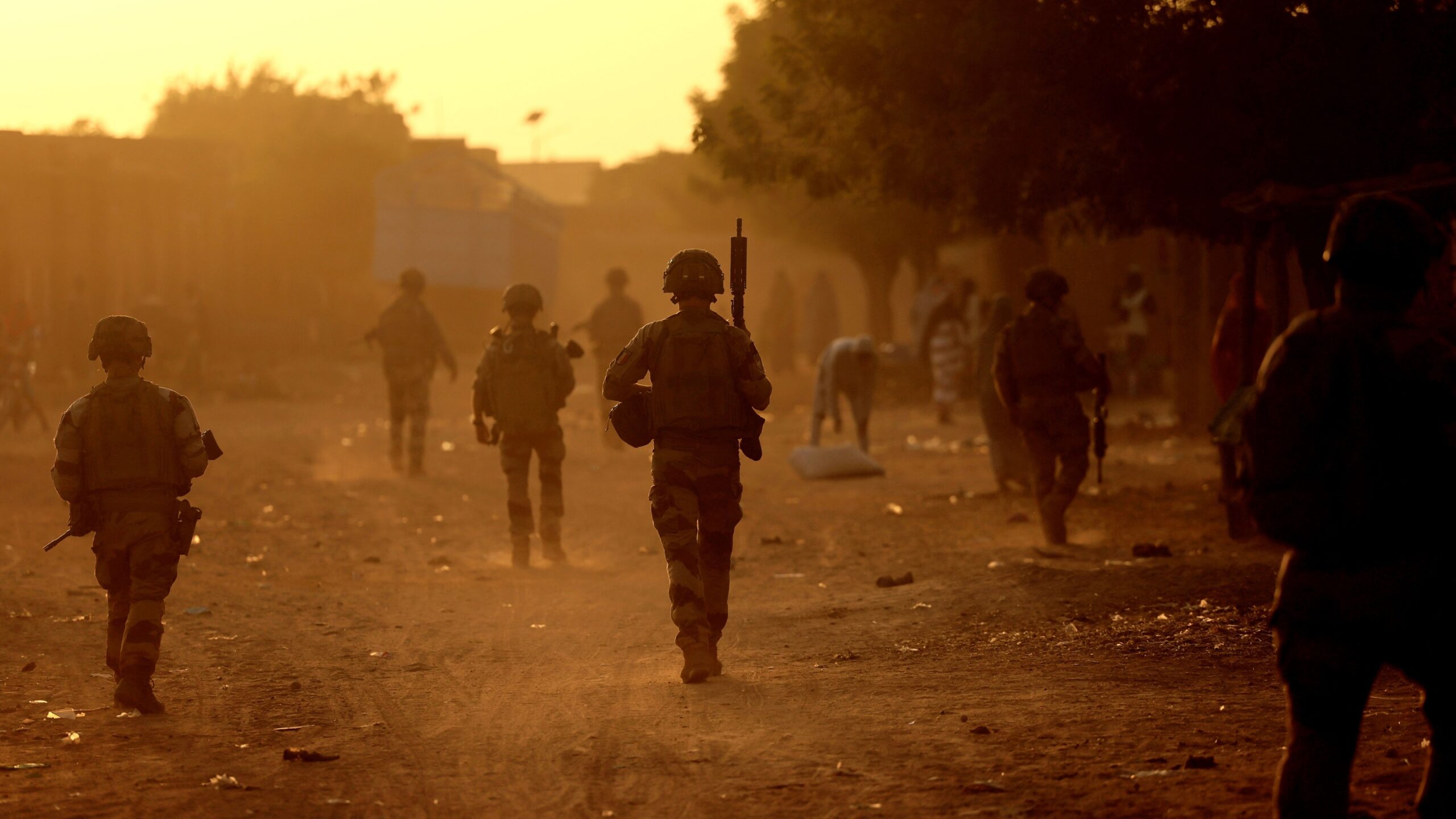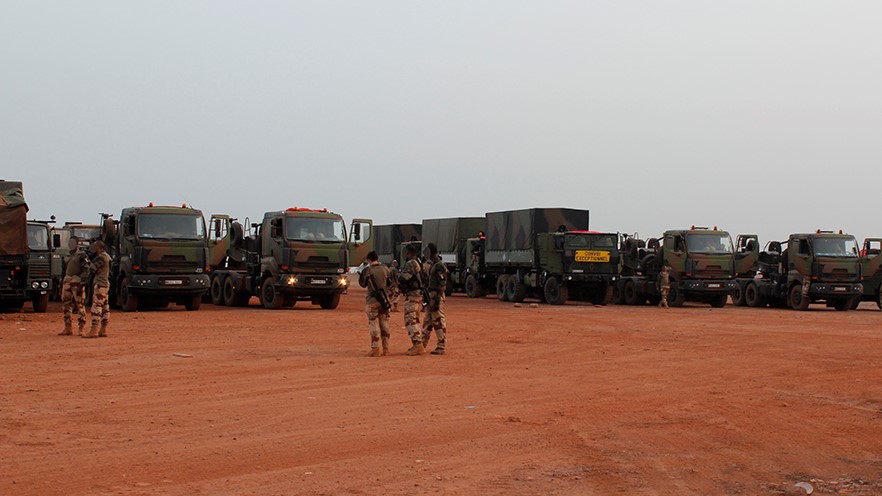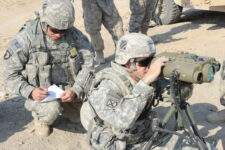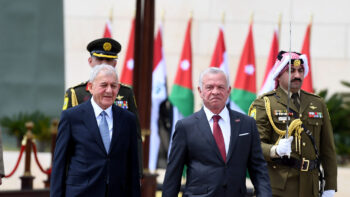
French soldiers patrol the streets of Gao on December 4, 2021. (THOMAS COEX/AFP via Getty Images)
WASHINGTON/PARIS: In Feb. 1961, the first cooperation agreement was signed between Mali and the then-USSR, following Mali’s independence from France several months earlier. History now seems to be echoing itself, with the Mali government once again seeking the help of the Russians to train and equip its forces in lieu of the French.
They picked an increasingly familiar sight on the continent in the form of the Wagner Group. Technically a mercenary group, Wagner is seen as an irregular part of Russia’s military, one which is used by Moscow to spread its aims around the world without having to formally send Russian forces. It has been a regular in the Central African Republic for four years but has also been deployed to Syria, Yemen, Libya, Sudan, Mozambique and Madagascar, focused “principally on protecting the ruling or emerging governing elites and critical infrastructures’’ according to a recent report by the Brookings Institution.
It’s a change noted by Gen. Stephen Townsend, the head of US Africa Command, who on March 17 testified to the US House Armed Services Committee that the appearance of Wagner is part of a worrying trend of Russia increasing its presence in Africa at the loss of Western powers.
“They’ve invited Wagner in because they believe that Wagner will replace the French and do a better job,” Townsend said. “When I learned of this, I traveled to Mali and I met with the president there… And I explained that I thought it was a bad idea to invite Wagner in because we’ve seen them – I have seen them in Syria and I have seen them in other places in Africa, and Wagner obeys no rules, they won’t follow the direction of the government, they won’t partner more effectively.”
“I think,” Townsend said, “that only bad will come from that.”
The Feb. 17 decision by French President Emmanuel Macron to withdraw from Mali has left a bitter taste for the French soldiers who fought there over nine years, losing more than 50 brothers in arms. To not just leave the mission behind, but in the hands of Wagner, which has been accused of potential war crimes, is particularly galling.
At the same time, French officers, echoing the French chief of staff’s official statement to the armed forces argue that the abrupt exit from Mali cannot be seen as a failure of the French military mission itself, but rather the result of both local and global politics. The mission itself, they tell Breaking Defense, was ultimately a success, even if the ending is not what was envisioned.
“While some will … talk about defeat … nothing could be more untrue,” French chief of staff Gen. Thierry Burkhard said in the February 17th official statement. “We are not leaving Mali under the pressure of terrorist groups and both our military capabilities and our determination to fight terrorism in the region remain intact.”
Mali Coup
In Mali, the number of Russian mercenaries is believed to have grown from about 40 in December to close to 1,000 today, taking over in particular the Timbuktu military installations recently transferred by the French military to the Malian armed forces.
‘’Wagner is going to inherit all that,” Air Brigadier General Cyril Carcy, former deputy commander of the French counter terrorism Barkhane Force and current defense attaché in Washington, told Breaking Defense. However, Carcy predicts that the Russians may encounter difficulties to hold such a vast territory in the long run, as it requires more manpower.
The precipitating incident for the fallout between France and Mali was a May 2021 military coup — the second in less than a year — which overthrew the sitting government. Despite pledges to restore democracy, the most recent offer from the coup-based leadership came in January, stating that votes could be held in 2026.
As a result, the Economic Community of West African States (ECOWAS) adopted sanctions against the Malian junta. In turn, Mali moved to hinder the multinational forces initially deployed to fight terrorism, ever since Bamako almost felt in the hands of the jihadists in January 2013, in particular by denying flight authorizations or drone use over parts of Mali territory and of course by using disinformation.

A French logistic convoy during the Serval Operation in 2013. (Murielle Delaporte/Staff)
With relations quickly deteriorating, the government in Paris announced on Feb. 17 it was pulling up stakes on its Mali efforts. But Burkhard argues that the mission was a success: “During nine years, French armed forces fulfilled their missions. Mali did not collapse and did not become an international terrorism sanctuary,” he said.
At its peak, Barkhane included 5,100 troops and it is estimated that 125,000 French soldiers have been deployed overall in the Sahel in the past nine years. About 4,200 French troops are currently part of an operation covering the five countries of the G5-Sahel, a number dropping to 2,500 within the next six months.
“Other African countries do not like the Malian drift [towards] holding on to power. In this background and due to multiple obstructions by the Malian transitional authorities, we [concluded] that the political framework and necessary conditions to continue the fight against armed terrorist groups alongside the Malian armed forces are no longer present,” explained Carcy. ”And this is the key reason why, in concertation with all its allies, France along with its partners has decided to leave Mali and redeploy.”
It may be tempting to compare the exit from Mali to Afghanistan, but that would miss the simple fact that the Barkhane operation is not shutting down, simply shifting location. In many ways it follows the tradition of France’s past military operations and constant redeployments, which have always evolved and adapted to the threat and the political changes on the African continent.
‘’The French Chief of Staff refers to it as a repositioning of our force posture,” said Carcy. ‘’The fight against the terrorist groups is going to be pursued at the request and with the support of the neighboring countries, in particular Niger and Burkina Faso, while our presence will be enhanced in Western African countries, i.e. Senegal, Ivory Coast, Ghana, Benin and Togo.”
The repositioning will be co-built with local partners. For instance, Niger, where French and US troops have already been working side by side in Niamey and Ouallam for years, will likely play an important role in future operations.
For all that, the French authorities point out that the record of these nine years in Mali have brought a lot of successes ranging from the elimination of many terrorists and their chain of command —such as the recent neutralization of Al Qaeda in the Islamic Maghreb chief Abdelmalek Droukdal in February 2020 or Islamic State in the Greater Sahara leader Adnan Abou Walid al Sahraoui in August 2021 — to the conduct of numerous development projects. Indeed international aid flowing in the G5-Sahel currently reaches $2 billion a year.
Lastly, illustrating the fact that counter-terrorism operations are still a major priority, on the night of February 25 the Barkhane force conducted a successful operation targeting an AQIM senior leader and historic player in the spread of the jihadist threat in West Africa, approximately 50 miles North of Timbuktu in Mali. The operation led to the neutralization of the Algerian jihadist Yahia Djouadi, also known as Abu Ammar al Jazairi.
”Development and enhancing security via the training of armed forces remain more than ever key to contain chaos and the terrorist threat, a recipe which will be implemented in Mali’s neighboring countries,” Carcy said. “At the end of the day, you need to provide to the young population a different perspective than joining a jihadist group. Such a goal requires creating stability, allowing the return of the state and creating development projects in the areas the Barkhane force has been freeing from the jihadists.
“All these steps take time and need strategic patience.”
Army eyes TBI monitoring, wearable tech for soldiers in high-risk billets
“We are also looking at what additional personal protective equipment we can provide to our folks, especially instructors and others who are routinely exposed to blast pressure,” said Army Secretary Christine Wormuth.


























